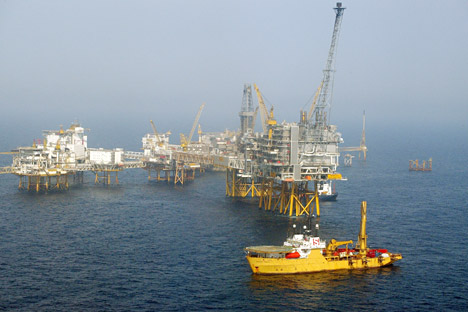Is the Russian economy about to be hit by a new drop in oil prices?

The drop in oil prices is due to the volume of reserves, according to experts.
Shutter Stock/Legion MediaOil storage facilities in the U.S. and Europe have been filled at a record level thanks to the continued slump in the price of crude. In the future, oversupply may lead to a drop in oil demand and a sharp decline in the price of hydrocarbons, said Goldman Sachs analysts in a research report published on Oct. 27.
“This raises the specter of 1998 [and] 2009 when distillate storage hit capacity, pushing runs and crude oil prices sharply lower," warned experts from the U.S. investment banking multinational.
This scenario represents a serious threat to the Russian economy – according a report by CitiGroup, the fall in oil prices by $10 per barrel will lead to a reduction in GDP of 0.8 percent.
Little room for optimism
This is not the first time that Goldman Sachs analysts have scared the market with forecasts of falling oil prices, said Georgy Vashchenko, head of Russian stock market operations at the Freedom Finance investment company.
"From their recent forecasts – the price could reach $20 a barrel and remain at that level for decades," he said.
The drop in oil prices is due to the volume of reserves, explained Vashchenko, but this is the opposite of causation: Reserves become greater because of falling prices, and not vice versa.
According to Pyotr Dashkevich, an analyst at investment company UFS, stocks are growing due to concerns of possible supply disruptions from the Middle East.
"There is no guarantee as yet that it necessarily will result in a massive 'release' of oil in the market," he said.
But quotations are already responding to another batch of negative forecasts: On Oct. 29, Brent crude oil fell by 1.57 percent to $48.3 per barrel.
According to Vashchenko, the period of low prices has already lasted for more than six months – ample time for consumers fill their storage facilities to the brink.
"All known information is taken into account in current prices and, in particular, information on the filling of storage facilities," said Alexei Baskakov, head of the assessment department at Finekspertiza.
According to him, in any case this will exert a slight negative pressure on oil prices, and only a slight reduction in soft quotes can be expected from the OPEC meeting in December 2015.
Two choices
Effectively, the industry has two choices – either to wait for a growth in demand or reduce production, said Dashkevich.
"No one wants to reduce production so far, and it is only the most inefficient producers that leave the market, including offshore projects and some shale deposits," he explained.
At the same time, Russian analysts say that despite the forecasts, the fall in oil prices will not lead to the closing of shale deposits in the United States.
"The U.S. continues to extract oil even at $45 per barrel; the number of closed wells is very small," said Baskakov. According to Vashchenko, meanwhile, American deposits are profitable even at the price of $40 per barrel.
Over the last year, the volume of shale oil produced in the U.S. has barely changed, said Semyon Nemtsov, an analyst from Russ-Invest, explaining that while the least efficient companies are leaving the market, the more successful producers are taking their share.
The efficiency of production in the U.S. is growing every year by dozens of percent, and the new technologies that are in active use there reduce production costs by about $5-10, Nemtsov explains.
Read more: Cut-price Saudi oil squeezing Russia out of European market>>>
All rights reserved by Rossiyskaya Gazeta.
Subscribe
to our newsletter!
Get the week's best stories straight to your inbox
